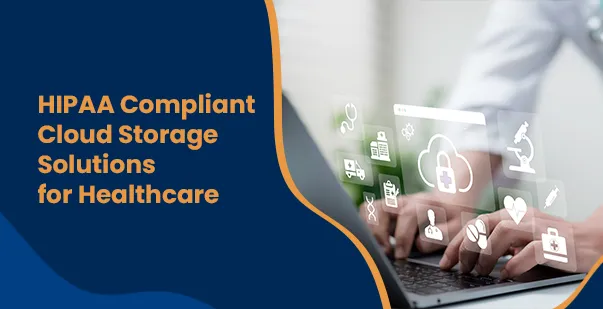5 HIPAA-Compliant Cloud Storage Solutions for Healthcare

October 13, 2025
If you work in healthcare today, cloud storage isn’t just a convenience – it’s part of daily operations. From storing patient charts to sharing lab results, the right platform can make things faster, easier, and more secure. But with sensitive medical data, there’s no room for mistakes. The wrong choice can mean costly fines, lawsuits, and loss of trust.
HIPAA (Health Insurance Portability and Accountability Act) sets strict rules for handling protected health information (PHI). Not all cloud providers meet these rules – and even the ones that do require certain agreements and safeguards to be in place.
The five solutions below stand out for their security, reliability, and fit for healthcare needs. Whether you’re a solo provider, a large hospital system, or building the next telehealth app, there’s an option here for you.
1. HIPAA Vault
Why it stands out
HIPAA Vault is a fully managed HIPAA compliant cloud storage and hosting service designed specifically for healthcare. That means you don’t have to be an IT expert to keep your data secure. Their team handles encryption, backups, updates, and monitoring around the clock. They also sign the Business Associate Agreement (BAA) you need to be compliant.
Real-world example
A small dermatology clinic in Texas uses HIPAA Vault to store and share patient images securely. With no internal IT staff, they rely on HIPAA Vault’s 24/7 support to keep systems running and respond immediately if something goes wrong.
Key features
- End-to-end encryption (in-transit and at-rest)
- Continuous server monitoring and intrusion detection
- Automatic daily backups with quick restore options
- Fully managed compliance updates
Why it matters
If you run a small practice or telehealth business, you may not have the resources to hire a full tech staff. HIPAA Vault removes that barrier by providing expert-level security as part of the service. You get peace of mind knowing your ePHI is stored safely – without having to manage the tech yourself.
2. Amazon Web Services (AWS)
Why it stands out
AWS is one of the biggest names in cloud computing, offers a range of HIPAA-eligible services. It’s incredibly flexible – you can store files, run apps, and connect systems all in one place. Once you sign a BAA and configure their security tools, AWS becomes a powerful HIPAA compliant cloud option.
Real-world example
A multi-location hospital network uses AWS S3 storage to keep radiology images and medical records in one centralized, secure location. They integrate AWS with their electronic health record (EHR) system so authorized staff can access files instantly from any facility.
Key features
- Multiple HIPAA-eligible services (S3, RDS, EC2, Lambda)
- Strong encryption, version control, and redundancy
- Fine-grained access permissions using AWS IAM
- Scales from small projects to enterprise-level workloads
Why it matters
AWS is a good fit for larger healthcare systems or tech teams building custom solutions. It offers scalability – so you can start small and grow without changing providers. The trade-off is that your team is responsible for setting up and managing the security settings to stay compliant.
3. Google Cloud Platform (GCP)
Why it stands out
Google Cloud has been gaining popularity in healthcare thanks to its easy-to-use tools and strong analytics features. It offers HIPAA-eligible services like secure storage, databases, and machine learning tools. Like AWS, it requires a signed BAA and proper configuration.
Real-world example
A telehealth startup uses GCP to store patient session recordings securely while also analyzing anonymized data for service improvement. They leverage Google’s BigQuery tool to run fast analytics without ever exposing identifiable PHI.
Key features
- HIPAA-eligible storage with encryption and logging
- Seamless integration with Google Workspace
- AI and analytics tools for large datasets
- Built-in redundancy for high availability
Why it matters
If your organization already uses Google Workspace, GCP can be a natural fit. You can integrate your storage with Gmail, Google Docs, and other familiar tools – all while keeping PHI secure when set up correctly.
4. Box (with HIPAA Configuration)
Why it stands out
Box is a widely used HIPAA-compliant cloud storage and collaboration platform. It’s especially known for its easy file sharing and integrations with apps like Microsoft Office, Slack, and Zoom. With HIPAA settings turned on and a signed BAA, Box becomes a compliant and user-friendly option for healthcare document storage.
Real-world example
A counseling center uses Box to share therapy notes and treatment plans between therapists and case managers. Access is restricted to authorized users, and audit logs track every file view and download.
Key features
- Secure file sharing and role-based permissions
- Built-in watermarking and access expiration dates
- Detailed audit logs for compliance checks
- Integration with major productivity platforms
Why it matters
Box is great for teams that need to collaborate on documents securely. It keeps things simple for staff while offering strong access controls, encryption, and detailed audit logs.
5. Sync.com (for Teams)
Why it stands out
Sync.com offers zero-knowledge, end-to-end encryption, meaning only you can see your files – not even Sync’s employees have access. It’s simple to use and more affordable than many other HIPAA compliant storage options.
Real-world example
A small mental health practice stores all patient intake forms and treatment notes in Sync.com. Even if the company were hacked, the encryption keys are only held by the practice, keeping the data unreadable to outsiders.
Key features
- End-to-end zero-knowledge encryption
- Password-protected file links for sharing
- Detailed admin controls for team accounts
- Affordable pricing plans for small teams
Why it matters
For small practices or solo healthcare providers who want maximum privacy without the high price tag, Sync.com is a great choice. It’s also a strong fit for professionals who handle especially sensitive information and want extra peace of mind.
Quick Comparison Table
| Provider | BAA Provided | Encryption Type | Best For |
| HIPAA Vault | Yes | Fully managed | Small to medium healthcare teams |
| AWS | Yes | Configurable | Large systems, custom builds |
| Google Cloud | Yes | Configurable | Google Workspace users |
| Box | Yes | Strong | Teams needing collaboration & sharing |
| Sync.com | Yes | Zero-knowledge | Maximum privacy on a budget |
What These HIPAA Compliant Storage Solutions Teach us
As Becker’s Health IT reports, cloud security in healthcare is a growing priority in 2025. From these five providers, a few lessons stand out:
- The BAA is non-negotiable.
Without it, even the most secure cloud isn’t HIPAA compliant. Always get the agreement signed before storing any PHI. - Encryption is a must, but not enough on its own.
You also need audit logs, role-based access, and regular security updates. - Privacy levels differ.
Zero-knowledge platforms like Sync.com offer the highest privacy, while managed services like HIPAA Vault offer the most convenience. - Your needs should guide your choice.
If you have a tech team, AWS or Google Cloud give you more control. If not, managed or user-friendly services like HIPAA Vault or Box may be better.
Conclusion
Choosing the right HIPAA compliant cloud storage is about more than ticking boxes for security – it’s about protecting patient trust, meeting legal requirements, and making daily work easier for your team. Whether you go with a fully managed service like HIPAA Vault, a flexible giant like AWS or Google Cloud, a collaboration-friendly tool like Box, or a privacy powerhouse like Sync.com, the key is to set it up correctly and keep security practices strong.
HIPAA compliance isn’t a one-time decision – it’s an ongoing commitment. When you pair the right cloud platform with smart security habits, you create a safer, smoother experience for both your staff and the people you care for.
FAQs
1) What exactly is HIPAA compliant cloud storage?
It’s a cloud storage service that meets all the technical, physical, and administrative safeguards required by HIPAA to protect patient health information (PHI). This usually means the provider offers encryption (both while data is being sent and while it’s stored), detailed logging of access, secure authentication, and is willing to sign a Business Associate Agreement (BAA) confirming they’ll protect the data according to HIPAA rules. Without the BAA, the service isn’t considered compliant, no matter how secure it seems.
2) Why is a Business Associate Agreement (BAA) so important?
Under HIPAA, any vendor that stores, processes, or transmits PHI on your behalf is considered a “business associate.” A BAA is a legal document where they agree to handle the data according to HIPAA standards. It also outlines their responsibilities if there’s a breach. Without it, you’re automatically non-compliant – and at risk for fines.
3) How do I know if my cloud storage is set up correctly for HIPAA?
Even if you choose a HIPAA-ready provider, you still need to configure it securely. That might include: limiting user access to only those who need it, turning on multi-factor authentication, reviewing audit logs regularly, and disabling any sharing features that could expose data publicly. Many providers have setup guides for HIPAA customers – following them is essential.
4) Can I make common tools like Google Drive or Dropbox HIPAA compliant?
Possibly – but only if you have a business or enterprise account that supports HIPAA compliance, configure the settings correctly, and sign a BAA with the provider. Free or personal accounts do not meet HIPAA requirements. You’ll also need to ensure your internal policies and staff training match HIPAA standards.
5) What’s the difference between encryption and “zero-knowledge” encryption?
Encryption scrambles your data so it’s unreadable without the right key. Zero-knowledge encryption takes it a step further – the service provider doesn’t hold the keys at all, so even they can’t access your files. This is what Sync.com offers, giving you an extra layer of privacy.
6) How often should we review our HIPAA cloud storage setup?
At least once a year – and any time there’s a change in regulations, provider features, or your internal processes. Regular reviews help catch outdated permissions, unused accounts, or changes in the provider’s terms that could affect compliance.





